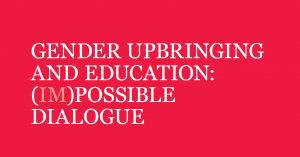10 May Gender upbringing and education: (im)possible dialogue
Can upbringing and education be in a state of conflict despite the fact that they are usually seen as intertwined, mutually adjusted and complementary? Why should we even pose this question? Why is it the case that even though we put so much effort into raising and educating our children, even though we reflect so carefully on how to educate them as professionals, we still have to search for better solutions and try to eliminate, ameliorate the selfish and self-indulgent practices that simply fail to teach our children, as well as adults, to be caring and full of understanding for the other, the different, the similar which can never be identical? Who am I similar to, who am I different from and whom do I recognize myself in?
are usually seen as intertwined, mutually adjusted and complementary? Why should we even pose this question? Why is it the case that even though we put so much effort into raising and educating our children, even though we reflect so carefully on how to educate them as professionals, we still have to search for better solutions and try to eliminate, ameliorate the selfish and self-indulgent practices that simply fail to teach our children, as well as adults, to be caring and full of understanding for the other, the different, the similar which can never be identical? Who am I similar to, who am I different from and whom do I recognize myself in?
The (im)possibility of dialogue, therefore, is not to be found in the simple succession of these processes, but in the dialectic that takes shape precisely within the proximities that we all establish in the course of education and upbringing. Understanding the gender dimension of these proximities will definitely lead us further in the direction that we should all be following.
Publication with recommendations for all actors in the educational process in Serbia was created within the project “Building and Strengthening Family-School Partnership”. This project is financially supported by The Royal Norwegian Embassy in Belgrade www.norveska.org.rs.
Gender Upbringing and Education: (Im)possible Dialogue
Edited by Sanja Milutinović Bojanić, Jelena Ćeriman
The publication was produced within the project “Building and Strengthening Family-School Partnership”, financially supported by the Royal Norwegian Embassy in Belgrade.


